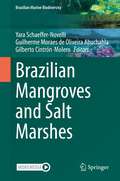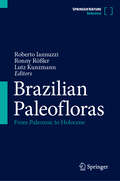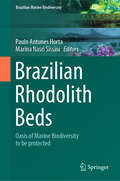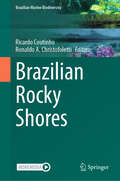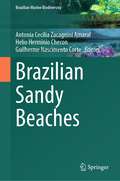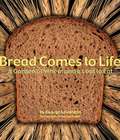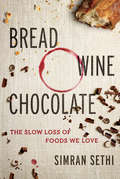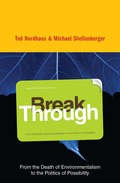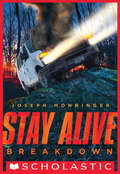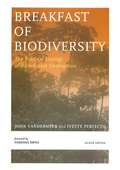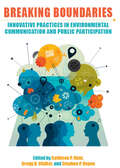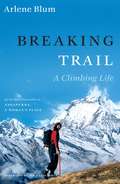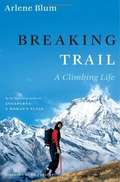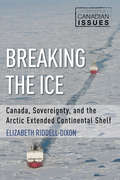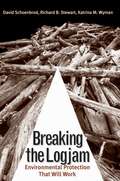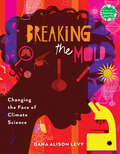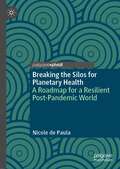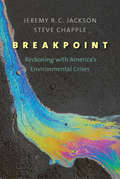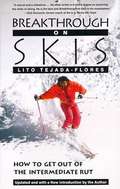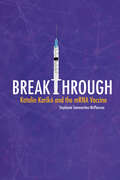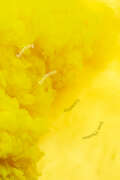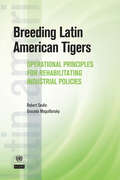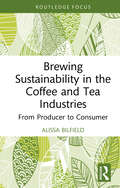- Table View
- List View
Brazilian Mangroves and Salt Marshes (Brazilian Marine Biodiversity)
by Yara Schaeffer-Novelli Guilherme Moraes de Oliveira Abuchahla Gilberto Cintrón-MoleroThis book offers a new ecosystemic approach to the understanding of mangrove and salt marsh ecosystems. Brazil has one of the largest areas of mangroves in the world, where salt marshes might or might not be associated. Different landscapes comprise the extensive coastline, where mangrove and salt marsh species’ composition is discussed through the analysis of physiography, zonation, and succession processes. Both salt marsh and mangrove plants and the associated macroalgae will be characterized in their ecophysiological and phenological aspects, as well as genetic and epigenetic diversity. The chapters on microbial diversity and litterfall expose the well-known importance of these ecosystems as highly productive carbon sinks and pumps. The associated fauna of invertebrates (benthic meio and macrofaunas, especially brachyuran crabs) and vertebrates (fishes, birds, and mammals) are presented in a special section. The conservational approach encompasses issues, such as historical ecology, economic valuation, protected areas, environmental education, climate changes, and adaptive management.
Brazilian Paleofloras: From Paleozoic to Holocene
by Roberto Iannuzzi Ronny Rößler Lutz KunzmannThis book will cover the entire evolutionary history that the terrestrial plants have recorded in Brazilian sedimentary rocks, ranging from the first vestiges of terrestrial environments colonization about 400 million years ago, until reaching the eve of the present time, when the current vegetation formations were organizing to reach their current distribution, diversity and structure in modern biomes. At present Brazil is home to the world's greatest plant biodiversity and we aim to offer here an opportunity to appreciate how this floral biodiversity originated and developed in these lowlands of South America, through chapters elaborated by the best Brazilian paleobotanist and palynologists in collaboration with foreign experts who dedicate to elucidate the evolution of the ancient flora in this part of the planet.
Brazilian Rhodolith Beds: Oasis of Marine Biodiversity to be protected (Brazilian Marine Biodiversity)
by Paulo Antunes Horta Marina Nasri SissiniRhodolith beds form biogenic reefs, oases of high biodiversity in sedimentary seabed environments. The rhodoliths are foundation species, which provide shelter and substrata for important and abundant benthic communities. Currently they have been recognized as an important player to the carbon balance, contributing to the planetarium climatic equilibrium. In Brazil, these environments are frequent and abundant and can be major carbonate ‘factories’ with a key role in the biogeochemical cycling of carbon in the South Atlantic Ocean. However, these organisms and environments are under threat from climate change, particularly ocean acidification and global warming, as well as local stressors such as fishing impacts and coastal run-off. In our book, written by dozens of researchers from different regions and expertise, you will dive more deeply in these and many other subjects related to this wonderful and vulnerable pink and dynamic underwater ecosystems.
Brazilian Rocky Shores (Brazilian Marine Biodiversity)
by Ricardo Coutinho Ronaldo A. ChristofolettiRocky shores correspond to a very particular habitat in Brazil, which is concentrated in the Southeastern and Southern coasts. There are different types of substrata and seascapes that cause a high environmental heterogeneity responsible to host a high species biodiversity and a range of ecosystem services. Primary and secondary production, as well as structuring organisms and processes, differs from temperate areas.
Brazilian Sandy Beaches (Brazilian Marine Biodiversity)
by Antonia Cecilia Zacagnini Amaral Helio Herminio Checon Guilherme Nascimento CorteMore than 4000 beaches distributed along the Brazilian coastline are one of the country's main assets. They harbor endemic and diverse biota and provide numerous goods and services essential to human populations. However, they are under increasing pressure, trapped between the impacts of climate change and human activities in the terrestrial and marine environment, and the knowledge about their environmental characteristics and biodiversity is still insufficient to ensure their preservation. This book is the first-ever comprehensive work about Brazil's sandy beaches addressing their physical, ecological, and social aspects. It was written by an interdisciplinary group of leading Brazilian researchers from different regions of the country and also had the contribution of a few international experts. The information synthesized in this book is accessible to anyone who wants to know more about Brazilian coastal biodiversity and represents a significant step towards conserving Brazilian sandy beaches, their biodiversity, and ecosystem services.
Bread Comes to Life: A Garden Of Wheat And A Loaf To Eat
by George Levenson Shmuel ThalerNIMAC-sourced textbook
Bread Comes to Life: A Garden of Wheat and a Loaf Eat
by George LevensonFrom a patch of wheatgrass in his backyard, award-winning filmmaker George Levenson takes readers on a tour of bread made from scratch. A thresher, a grinder, and finally a doughy combination of flour, water, yeast, and oil combine to make a freshly baked loaf of whole wheat bread. With energetic, poetic text and vivid photographs, the creative team behind PUMPKIN CIRCLE: THE STORY OF A GARDEN shows children that there's a lot more to this kitchen staple than they might expect.
Bread, Wine, Chocolate: The Slow Loss of Foods We Love
by Simran SethiAward-winning journalist Simran Sethi explores the history and cultural importance of our most beloved tastes, paying homage to the ingredients that give us daily pleasure, while providing a thoughtful wake-up call to the homogenization that is threatening the diversity of our food supply.Food is one of the greatest pleasures of human life. Our response to sweet, salty, bitter, or sour is deeply personal, combining our individual biological characteristics, personal preferences, and emotional connections. Bread, Wine, Chocolate illuminates not only what it means to recognize the importance of the foods we love, but also what it means to lose them. Award-winning journalist Simran Sethi reveals how the foods we enjoy are endangered by genetic erosion—a slow and steady loss of diversity in what we grow and eat. In America today, food often looks and tastes the same, whether at a San Francisco farmers market or at a Midwestern potluck. Shockingly, 95% of the world’s calories now come from only thirty species. Though supermarkets seem to be stocked with endless options, the differences between products are superficial, primarily in flavor and brand.Sethi draws on interviews with scientists, farmers, chefs, vintners, beer brewers, coffee roasters and others with firsthand knowledge of our food to reveal the multiple and interconnected reasons for this loss, and its consequences for our health, traditions, and culture. She travels to Ethiopian coffee forests, British yeast culture labs, and Ecuadoran cocoa plantations collecting fascinating stories that will inspire readers to eat more consciously and purposefully, better understand familiar and new foods, and learn what it takes to save the tastes that connect us with the world around us.
Break Through: Why We Can't Leave Saving the Planet to Environmentalists
by Michael Shellenberger Ted NordhausTwo of Time magazine&’s &“Heroes of the Environment&” reject the status quo of liberal politics and offer a bold vision for addressing climate change. Michael Shellenberger and Ted Nordhaus triggered a firestorm of controversy with their self-published essay &“The Death of Environmentalism,&” which argued that the existing model of environmentalism cannot adequately address global warming and that a new politics needs to take its place. In this follow-up to their essay, the authors give an expansive and eloquent manifesto for political change. American values have changed dramatically since the environmental movement&’s greatest victories in the 1960s. And while global warming presents exponentially greater challenges than any past pollution problem, environmentalists continue to employ the same tired and ineffective tactics. Making the case for abandoning old categories (nature versus the market; left versus right), the authors articulate a new pragmatism that has already found champions in prominent figures such as Hillary Clinton and Barack Obama. Seeing a connection between the failures of environmentalism and the failures of the entire left-leaning political agenda, the authors point the way toward an aspirational politics that will resonate with modern American values and be capable of tackling our most pressing challenges. &“To win, Nordhaus and Shellenberger persuasively argue, environmentalists must stop congratulating themselves for their own willingness to confront inconvenient truths and must focus on building a politics of shared hope rather than relying on a politics of fear.&” —The New York Times
Breakdown: Breakdown (Stay Alive #3)
by Joseph MonningerStranded in the middle of nowhere, you have to fight to survive!When the bus carrying a group of kids home from summer camp breaks down on an abandoned road during a heatwave, things go from bad to worse very quickly. There's nobody around to help. Sixty miles back the way they came in camp. Sixty miles the opposite direction is the highway. Neither direction is the source of much hope. With no way to call for help, this group must ride it out and survive the elements. Will they make it through?
Breakfast Of Biodiversity
by Vandana Shiva Ivette Perfecto John VandermeerThe continuing devastation of the world's tropical rain forest affects us all-spurring climate change, decimating biodiversity, and wrecking our environment's resiliency. Millions of worried people around the world want to do whatever it takes to save the forest that is left.But halting rain forest destruction means understanding what is driving it.In Breakfast of Biodiversity, John Vandermeer and Ivette Perfecto insightfully describe the ways in which such disparate factors as the international banking system, modern agricultural techniques, rain forest ecology, and the struggles of the poor interact to bring down the forest. They weave an alternative vision in which democracy, sustainable agriculture, and land security for the poor are at the center of the movement to save the tropical environment.
Breaking Boundaries: Innovative Practices in Environmental Communication and Public Participation (SUNY series in Environmental Governance: Local-Regional-Global Interactions)
by Kathleen P. Hunt; Gregg B. Walker; Stephen P. DepoeBreaking Boundaries analyzes efforts made by communities and policy makers around the world to push beyond conventional approaches to environmental decision making to enhance public acceptance, sustainability, and the impact of those decisions in local contexts. The current political climate has generated uncertainty among citizens, industry interests, scientists, and other stakeholders, but by applying concepts from various perspectives of environmental communication and deliberative democracy, this book offers a series of lessons learned for both public officials and concerned citizens. The contributors offer a broader understanding of how individuals and groups can get involved effectively in environmental decisions through traditional formats as well as alternative approaches ranging from leadership capacity building to social media activity to civic technology.
Breaking Trail
by Arlene BlumArlene Blum is a legendary trailblazer by any measure. Defying the climbing establishment of the 1970s, she led the first teams of women on successful ascents of Mt. McKinley and Annapurna, and was the first American woman to attempt Mt. Everest. In her long, adventurous career, she has played a leading role in more than twenty expeditions and forged a place for women in the perilous arena of high-altitude mountaineering. Breaking Trail is the story of Blum's journey from her overprotected youth in Chicago to the tops of some of the highest peaks on Earth. Chronicling a life of extraordinary personal and professional achievement, Blum's intimate and inspiring memoir explores how her childhood fueled her need to climb -- and how, in turn, her climbing liberated her from her childhood. Each chapter in Breaking Trail begins with a poignant vignette from Blum's early life. Using these as starting points, she traces her evolution as a climber, from a hilariously incompetent beginner to an aspiring mountaineer to a successful, confident, and world-renowned expedition leader. Along the way, she takes us to some of the most extreme and exquisite places on the planet, sharing the exhilaration, toil, and danger of climbing high. Blum also relates the story of her scientific career, which, like her mountaineering, challenged gender stereotypes and was filled with singular accomplishments, including the banning of two cancer-causing chemicals and the initiation of an important area of biophysical research. Writing with remarkable candor and introspection, Blum recounts her triumphs and tragedies, and provides a probing look at what drove her to endure extreme physical discomfort -- and even to risk her life -- attempting high, remote summits around the world. In her story, she shares intimate insights into how and why climbers persevere under the harshest circumstances, cope with the deaths of their comrades, and balance their desire for adventure with their personal lives. Complemented with breathtaking personal photos and detailed maps, Breaking Trail is a deeply moving account of how one woman overcame adversity to become one of the world's most famous climbers, and a testament to the power of taking risks and pursuing dreams.
Breaking Trail: A Climbing Life
by Arlene BlumArlene Blum is a legendary trailblazer by any measure. Defying the climbing establishment of the 1970s, she led the first teams of women on successful ascents of Mt. McKinley and Annapurna, and was the first American woman to attempt Mt. Everest. In her long, adventurous career, she has played a leading role in more than twenty expeditions and forged a place for women in the perilous arena of high-altitude mountaineering. Breaking Trail is the story of Blum's journey from her overprotected youth in Chicago to the tops of some of the highest peaks on Earth. Chronicling a life of extraordinary personal and professional achievement, Blum's intimate and inspiring memoir explores how her childhood fueled her need to climb -- and how, in turn, her climbing liberated her from her childhood. Each chapter in Breaking Trail begins with a poignant vignette from Blum's early life. Using these as starting points, she traces her evolution as a climber, from a hilariously incompetent beginner to an aspiring mountaineer to a successful, confident, and world-renowned expedition leader. Along the way, she takes us to some of the most extreme and exquisite places on the planet, sharing the exhilaration, toil, and danger of climbing high. Blum also relates the story of her scientific career, which, like her mountaineering, challenged gender stereotypes and was filled with singular accomplishments, including the banning of two cancer-causing chemicals and the initiation of an important area of biophysical research. Writing with remarkable candor and introspection, Blum recounts her triumphs and tragedies, and provides a probing look at what drove her to endure extreme physical discomfort -- and even to risk her life -- attempting high, remote summits around the world. In her story, she shares intimate insights into how and why climbers persevere under the harshest circumstances, cope with the deaths of their comrades, and balance their desire for adventure with their personal lives. Complemented with breathtaking personal photos and detailed maps, Breaking Trail is a deeply moving account of how one woman overcame adversity to become one of the world's most famous climbers, and a testament to the power of taking risks and pursuing dreams.
Breaking the Ice: Canada, Sovereignty, and the Arctic Extended Continental Shelf (Contemporary Canadian Issues)
by John English Elizabeth Riddell-DixonThe Hill Times: Best Books of 2017. The Arctic seabed, with its vast quantities of undiscovered resources, is the twenty-first century’s frontier. In Breaking the Ice: Canada, Sovereignty and the Arctic Extended Continental Shelf, Arctic policy expert Elizabeth Riddell-Dixon examines the political, legal, and scientific aspects of Canada’s efforts to delineate its Arctic extended continental shelf. The quality and quantity of the data collected and analyzed by the scientists and legal experts preparing Canada’s Arctic Submission for the Commission on the Limits of the Continental Shelf, and the extensive collaboration with Canada’s Arctic neighbours is a good news story in Canadian foreign policy. As Arctic sovereignty continues to be a key concern for Canada and as the international legal regime is being observed by all five Arctic coastal states, it is crucial to continue to advance our understanding of the complex issues around this expanding area of national interest.
Breaking the Logjam: Environmental Protection That Will Work
by David Schoenbrod Richard B. Stewart Katrina M. WymanAfter several decades of significant but incomplete successes, environmental protection in the United States is stuck. Administrations under presidents of both parties have fallen well short of the goals of their environmental statutes. Schoenbrod, Stewart, and Wyman, distinguished scholars in the field of environmental law, identify the core problems with existing environmental statutes and programs and explain how Congress can fix them. Based on a project the authors led that incorporated the work of more than fifty leading environmental experts, this book is a call to action through public understanding based on a nonpartisan argument for smarter, more flexible regulatory programs to stimulate the economy and encourage green technology.
Breaking the Mold: Changing the Face of Climate Science (Books for a Better Earth)
by Dana Alison LevySixteen scientists. Protecting our planet. Making science more equitable.Scientists who collect microbes from surfers' skin, who use radar sensors to gather data miles away, who combat inequality by pushing for cleaner air policies. Each with their own story, all working to make life better for future generations.Celebrated author Dana Alison Levy profiles 16 people, all studying different elements of the earth&’s landscape, animals, and climate, who defy stereotypes of who can be a scientist. From analytical chemists to volcanologists, from global experts to recent graduates, these scientists share what they were like as young people, how they got where they are now, and what they—and the rest of us—can do to help the planet.Based on extensive interviews and featuring infographics and personal photos, Breaking the Mold offers a snapshot of the people and organizations fighting to make science more equitable. Back matter includes advice for readers interested in science careers, DIY projects, paths to community involvement, and more.Books for a Better Earth are designed to inspire children to become active, knowledgeable participants in caring for the planet they live on.
Breaking the Silos for Planetary Health: A Roadmap for a Resilient Post-Pandemic World
by Nicole de PaulaThis book translates the latest theoretical perspectives on the emerging field of Planetary Health Studies into the practical reality of global political decision makers. It builds on the scientific data on the impacts of environmental change on human health to propose practical methods for operationalizing planetary health. The book maps opportunities for decision makers to break institutional silos and engage with bottom-up approaches that can transform planetary health from a global idea into a local reality. The analysis frames human health in the Anthropocene, an era in which humans have become the most powerful force affecting global ecosystems, and reveals new existential risks for humankind.Departing from ongoing multilateral efforts to promote sustainability, the author’s analysis places the agenda of planetary health on the desk of political decision makers, still underrepresented at planetary health gatherings. Given the pressing need to implement sustainable development policies, the book presents planetary health as an overarching framework for global policy targets, notably the UN Sustainable Development Goals, the Paris Agreement on Climate Change, and the post-2020 biodiversity framework under the UN Convention on Biological Diversity. The book is timely in offering a concrete road map for practitioners and researchers interested in transforming the concept of planetary health into reality. With a collection of success stories, the analysis dwells on tools for community engagement, opportunities for health professionals training, gender empowerment, digital health, and innovative ways to enhance human well-being on a changing planet.
Breaking the Vicious Circle: Toward Effective Risk Regulation
by Stephen BreyerReprinted lectures and thoughts from a United States Supreme Court justice.
Breakpoint: Reckoning with America's Environmental Crises
by Jeremy B. Jackson Steve ChappleAn insightful look at the American environmental crisis and emerging solutions from the heartland to the coasts in the era of global climate change†‹ Eminent ecologist Jeremy B. C. Jackson and award†‘winning journalist Steve Chapple traveled the length of the Mississippi River interviewing farmers, fishermen, scientists, and policymakers to better understand the mounting environmental problems ravaging the United States. Along their journey, which quickly expands to California, Florida, and New York, the pair uncovered surprising and profound connections between ecological systems and environmental crises across the country. Artfully weaving together independent research and engaging storytelling, Jackson and Chapple examine the looming threats from recent hurricanes and fires, industrial agriculture, river mismanagement, extreme weather events, drought, and rising sea levels that are pushing the country toward the breaking point of ecological and economic collapse. Yet, despite these challenges, the authors provide optimistic and practical solutions for addressing these multidimensional issues to achieve greater environmental stability, human well†‘being, and future economic prosperity. With a passionate call to action, they look hopefully toward emerging and achievable solutions to preserve the country’s future.
Breakthrough on Skis
by Lito Tejada-FloresIn this wonderfully innovative yet practical guide to skiing, acclaimed instructor Tejada-Flores explains how to break the bad habits of an intermediate skier and learn to ski even the steepest, bumpiest slopes with the grace and speed of an expert.
Breakthrough: Katalin Karikó and the mRNA Vaccine
by Stephanie Sammartino McPhersonA thorough and accessible biography of Dr. Katalin Karikó, winner of the 2023 Nobel Prize in Physiology or Medicine, whose hard work pioneering mRNA research led to the COVID-19 vaccines. Her monumental contribution to global health care has rightfully placed Karikó as one of the most important scientists in history. She has won awards, given speeches, and appeared in magazines and television programs. But she wasn’t always famous—in fact, it took decades for anyone to recognize the importance of her research into RNA and the potential of mRNA to help cells fight off disease. Beginning with her birth in a small village in rural Hungary, Breakthrough tells the story of how a young girl interested in the wildlife around her became an internationally celebrated hero. Exuberant, devoted to her family, and hard-working, Karikó persevered in the face of challenges and obstacles that would have discouraged many of her peers. Her achievements remind us that if we believe in ourselves, no matter the setbacks we encounter, we can succeed.
Breathing Aesthetics
by Jean-Thomas TremblayIn Breathing Aesthetics Jean-Thomas Tremblay argues that difficult breathing indexes the uneven distribution of risk in a contemporary era marked by the increasing contamination, weaponization, and monetization of air. Tremblay shows how biopolitical and necropolitical forces tied to the continuation of extractive capitalism, imperialism, and structural racism are embodied and experienced through respiration. They identify responses to the crisis in breathing in aesthetic practices ranging from the film work of Cuban American artist Ana Mendieta to the disability diaries of Bob Flanagan, to the Black queer speculative fiction of Renee Gladman. In readings of these and other minoritarian works of experimental film, endurance performance, ecopoetics, and cinema-vérité, Tremblay contends that articulations of survival now depend on the management and dispersal of respiratory hazards. In so doing, they reveal how an aesthetic attention to breathing generates historically, culturally, and environmentally situated tactics and strategies for living under precarity.
Breeding Latin American Tigers: Operational Principles for Rehabilitating Industrial Policies in the Region
by Robert Devlin Graciela MoguillanskyThis book is motivated by the emerging rehabilitation of industrial policies as a tool for supporting economic transformation and high rates of growth in developing countries. It argues that underperforming disciples of the Washington Consensus' 'market fundamentalism' should learn and practice the art of systemic industrial policies, which requires a medium-long term strategic perspective and intelligent proactive state interventions in markets. However, it also stresses that rehabilitation requires that industrial policies be developed and implemented in a context of home- grown public-private alliances that avoid state 'capture' by special interests. It first examines the 'how' of industrial policy in the public sectors of ten non-Latin American countries in Asia, Europe, and Oceania that have been successful in promoting economic catch-up with rich countries, or have performed better than Latin American countries with similar resource endowments. The book defines '10+1' generic First Principles for the use, design, and execution of modern industrial policies, and then examines the experiences of nine Latin American and Caribbean governments against these First Principles. The authors identify large gaps in the organizational and operational effectiveness of their public sectors, and suggest ways to close these gaps.
Brewing Sustainability in the Coffee and Tea Industries: From Producer to Consumer (Earthscan Food and Agriculture)
by Alissa BilfieldThis book focuses on the often intertwined industries of coffee and tea, using accounts of single producer communities to highlight the transformation from plantation-style colonial agriculture towards systems that now claim to produce social and environmental benefits from the farm to the cup. Focusing on the dynamics of farmers' experiences producing coffee and tea ethically and sustainably at origin, the book shows how these values are transmitted and reinforced throughout the value chain. Exploring tandem case studies of fair trade cooperatives in Guatemala and Sri Lanka, it provides an insight into the creation of more sustainable value chains from producer to consumer in the global marketplace, incorporating the perspectives of coffee exporters, importers, roasters, and café owners. This book is focused on the prospects of the specialty movement in food as a catalyst for forging more authentic, just, and sustainable supply chains that consider both people and the environment. This book will be of great interest to students and scholars of food and agriculture, sustainable food systems and supply chains, the fair trade movement, sustainable development, and social entrepreneurship and social innovation.
